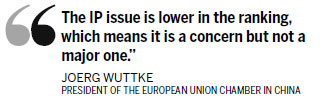EU companies praise IP laws but see areas to improve
The majority of European companies in China praise Chinese intellectual property laws and regulations, although many believe that enforcement still needs to be improved, and that this trend is improving, according to a report released on June 10 in Beijing by the European Union Chamber in China.
Jointly conducted with Roland Berger Strategy Consultants, the Business Confidence Survey 2015 polled more than 540 European companies operating in China, about the same number as took part last year.
About 20 percent of them are large-scale companies with more than 1,000 employees in China, and more than 80 percent of them have been in the market for at least five years.
"Innovation efforts need to be supported by China's written IP laws and regulations that can provide enhanced protection to European companies undertaking innovation," the report stated.
Eight percent of surveyed companies rated the effectiveness of China's IP laws and regulations as "excellent", a three percentage point increase from the previous year, and 53 percent viewed them as "adequate".
In terms of IP regulatory enforcement, 56 percent of European companies rated it as inadequate, while only 24 percent of them considered it to be excellent or adequate.
Although 56 percent is "worryingly high", it represents a nine percentage point drop from last year and an all-time low since 2009, when the number of companies that considered such enforcement inadequate stood at 95 percent.
"Change cannot be expected overnight," the report said. "It can be said that the trend is heading in the right direction."
Joerg Wuttke, president of the chamber, said, "We hold that patent enforcement should remain in the hands of experienced judiciary and courts rather than be devolved to administrative authorities."
He suggested to borrow from the IP court system in patent administrative enforcement by having the State Intellectual Property Office appoint dedicated local patent authorities to be responsible for investigating and handling cases, so sufficient resources are allocated.
While China is well aware that innovation will be one of the most critical drivers in its new economic model, the survey found that more than two-thirds of European companies that engage in research and development do not have an R&D center in China, and those with R&D presence still tend to use their centers heavily for product localization.
"This is in part a result of China's regulatory ineffectiveness and lax law enforcement, in particular regarding IP laws and regulations," the report said
However, 25 percent of those with R&D facilities in China said their Chinese innovation had reached global level, an "encouraging" increase from 13 percent last year, Wuttke said.
The companies said they would contribute more to the Chinese economy if they were provided with better IP protection.
IP protection ranked as seventh among the major regulatory obstacles that hampered the companies' economic performance in China, while the top concern was the unpredictable legislative environment.
"The IP issue is lower in the ranking, which means it is a concern but not a major one," Wuttke said.
He added that he thinks positively of China's 2025 vision, which has outlined what the nation wants to achieve over the next 10 years, but noted that there is currently a "disconnect" between China's innovation efforts and industrialization.
"There has been too much money thrown into the R&D world and too high a number of patents that don't actually show as products on the shelves," he said.
zhangzhao@chinadaily.com.cn

(China Daily 06/17/2015 page17)








